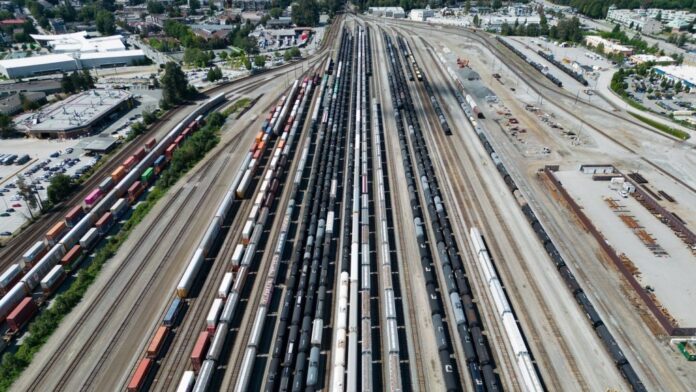MONTREAL –
For the first time in Canada, freight traffic on its two largest railways has ground to a halt simultaneously, threatening to throw supply chains completely out of balance after pandemic-related disruptions and a port strike last year.
In the culmination of months of increasingly bitter negotiations, the Canadian National Railway Co. and Canadian Pacific Kansas City Ltd. locked out 9,300 train drivers, conductors and shunting workers after the parties failed to agree on a new contract before a midnight deadline.
The Teamsters Canada Rail Conference has begun posting images on social media of workers from Halifax to Vancouver setting up picket lines.
The impasse also affects tens of thousands of commuters in Toronto, Montreal and Vancouver whose lines run on CPKC tracks. Passenger trains cannot run on those tracks without being dispatched by locked-out dispatchers.
GO Transit warned Thursday morning that its service “may be busier than usual.”
Regional transit for the Greater Golden Horseshoe region in southern Ontario said rail service had been suspended at Hamilton GO Centre and on the Milton Line, which runs through Mississauga to Union Station in downtown Toronto.
In Vancouver, TransLink said it was suspending West Coast Express service, while Exo said its Candiac, Saint-Jérôme and Vaudreuil/Hudson lines in the Montreal area would not operate.
Pressure from industry and government to break the deadlock has been building for weeks, and now that work stoppages have begun, calls for a solution are likely to grow even louder.
According to the Canadian Railway Association, the companies together transport goods worth a billion dollars every day. Many shipments have been stopped preventively to prevent cargo from becoming stranded.
The parties negotiated late into the night on Wednesday in hotels in Montreal and Calgary before the talks were broken off shortly before midnight.
Each side accused the other of not wanting to negotiate seriously.
“The railroads don't care about farmers, small businesses, supply chains or their own employees. Their only focus is increasing their profits, even if it means putting the entire economy at risk,” Teamsters President Paul Boucher said in a statement early Thursday morning.
Negotiations took place in separate negotiations between each company and the Teamsters, which represent 6,000 CN workers and 3,300 CPKC workers.
CN said it had negotiated in good faith over the past nine months.
“The company has consistently made serious offers, including better wages, longer rest periods and more predictable work hours. However, the Teamsters have shown no urgency or desire to reach an agreement that is good for workers, the company and the economy,” CN said.
CPKC called for binding arbitration, saying the union had made “unrealistic demands.”
Business associations also called on the government to intervene and introduce binding arbitration procedures for the duration of the proceedings and to ban strikes and lockouts.
Prime Minister Justin Trudeau on Wednesday called on both sides to work out an agreement at the negotiating table.
The sectors affected include agriculture, mining, energy, retail, automotive and construction. The US railroad also had to reject shipments to Canada.
Shippers south of the border also rely on Canada's two main rail lines, whose tracks run to the Gulf of Mexico and, in the case of CPKC, to several Mexican ports.
Meanwhile, Canadian ports fear that containers will pile up at docks as cargo remains unmoved, creating congestion along the route and causing some carriers to divert their routes to U.S. terminals.
This report by The Canadian Press was first published August 22, 2024.















